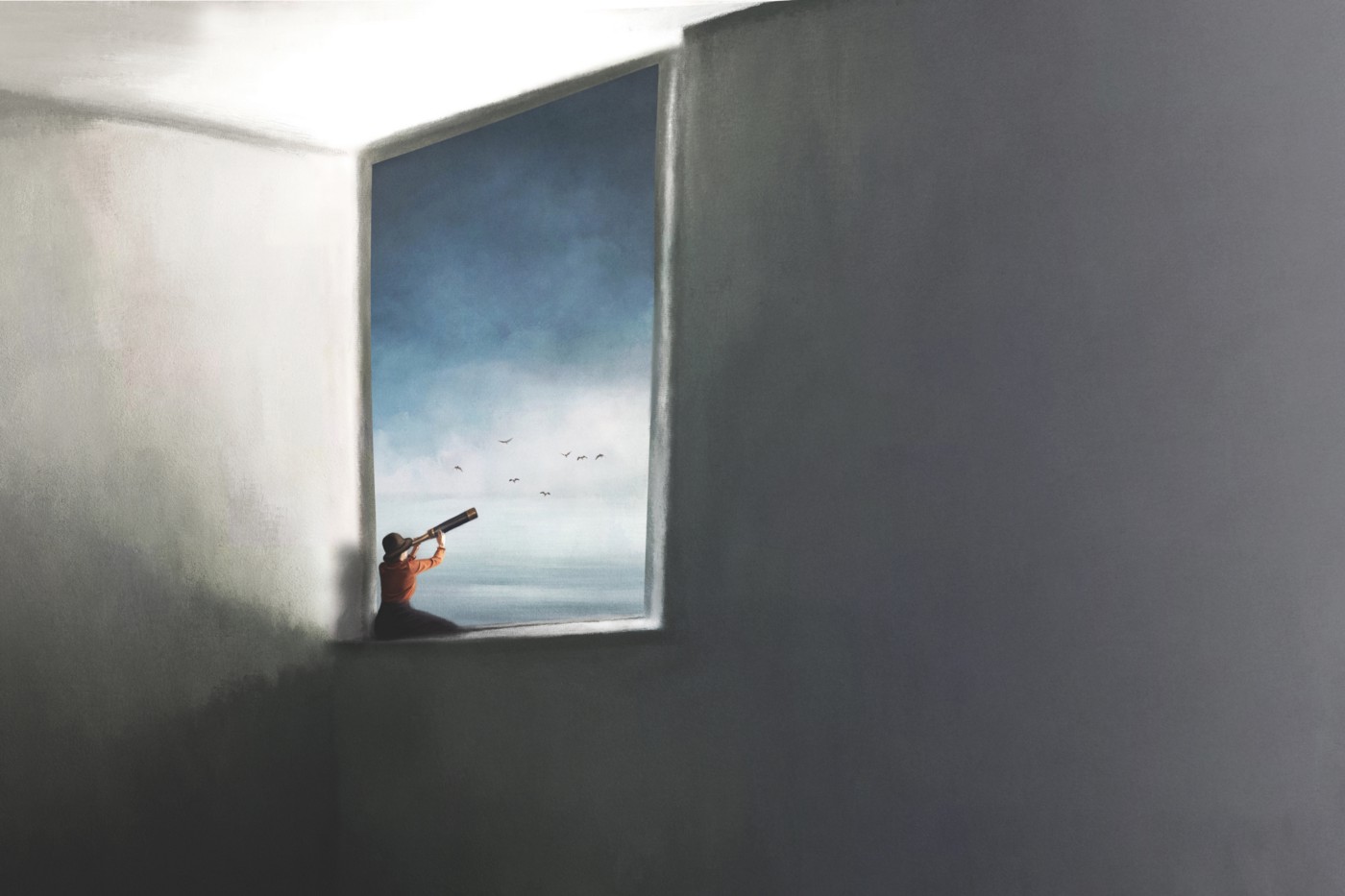
IMAGINE HOLDING A crystal ball that could reveal your marriage’s fate in ten, fifteen, or twenty years. Picture yourself gazing into the smokey orb while asking a series of questions: Will I be happy if I stay? Will my problems follow me if I leave? Is our marriage doomed to contempt, devoid of kindness, and forever riddled with blame no matter what we do?
At their core, such questions deal with regret and how it pertains to a relationship in crisis. They seek to discern the cost of taking action versus staying put. They are powerful because they poke at our hopes, fears, and, most importantly, the unknowable.
As a relationship expert, I suspect the fear of regret informs our decision to stay or leave an ailing marriage and influences our willingness to risk. Marital strife is a tempest of confusing emotions. We can feel utterly paralyzed or steeped in self-righteous indignation. We can hover on hope’s edge but opt to no longer risk connection. We can feel tired and defeated. If children are involved, the stakes are exceptionally high, and so, understandably, we can (also) feel conflicted. Whether to end one’s marriage is arguably one of the most challenging decisions many of us will make in our lifetime. The ramifications of staying versus leaving loom large, and it is normal to feel paralyzed. So I wonder, what can regret psychology teach us about marital crossroads where we contemplate severing a marriage and dissolving our vows? More pointedly, when we envision our future selves leaving our marriage once the kids are grown or signing on for the long haul despite years of gridlock or a lack of intimacy, might these contemplations have a ripple effect? Maybe imagining our future selves in potentially regretful scenarios causes us to dress-rehearse for tragedy and sets the stage for self-fulfilling prophecies that ultimately lead us asunder. Maybe imagining we have few options and fearing we are inherently unlovable commits us to a cozy yet banal existence?
When we distill it down, the question seems simple: Will taking action in my relationship cause it to change for the better or worse? But here is the rub, what is taking action? Is staying in an unhappy marriage and choosing to work on your relationship action? Is leaving your marriage action? What about doing nothing? Is that a case where non-action is a form of action in itself?
When left untended, marital problems eventually become a Gordian knot. The moments where we can successfully minister to our partner’s feelings with a few kind words, a hug, or a gesture of kindness become increasingly rare, complicated, and ineffective. For seemingly inexplicable reasons, healing from past hurts or recalling fond memories feels impossible. So, (understandably), we begin to believe that healing our marriage is not attainable, that the relationship has gone bad, and that maybe it is better to part ways — to spare our partner of oneself or oneself of one’s partner.
This is the land of negative sentiment override (NSO), a term coined by Dr. John Gottman, which speaks to the tendency toward viewing our partner and the history of our relationship through a darkened lens. It is a symptom as much as a state. Characterized by a loss of hope, our memories, once imbued with fondness, get recast in our mind’s eye and become concealed by gloom.

NSO is, in essence, a cumulative byproduct of missed opportunities for connection: sliding door moments, where we turn away (and against) junctures that necessitated our care and presence — we neglect to ask about the biopsy, forget to say we’ll be late, or dismiss the melancholy expression on our partner’s face — again and again. If you are here, you are likely exhausted, lonely, and wondering if relationships are supposed to be this much work. You may even be tempted to deal with your marital gridlock decisively and with force. The big red button called DIVORCE is flashing in your mind’s eye, and your fingertip is quivering. Most of us manage to abstain (until we don’t) from pushing that button. After all, it is far easier to remain in a known hell than to venture into unknown heaven. Intuitively, we sense that shaking up the status quo involves taking risks, and risk almost always equals uncertainty — which our brains are wired to loathe — so we bide our time.
To complicate matters, relationships can appear to pivot from acceptable to not overnight, leaving a relatively short window of opportunity between commitment and filing for divorce. According to Gottman’s research, the average couple waits six years from the onset of a problem to initiate couples therapy, and half of the marriages that end in divorce do so within the first seven years. It seems hindsight is where we recognize that all the signs were there: that gut feeling we chose to ignore, the comment we swept under the rug. A relationship has its seasons, and I am talking about the cusp of autumn — the time of year when we have an almost preternaturally-like ability to sense the shift in seasons. Before we glimpse that first gold leaf contrasted against a field of green, nature whispers that change is coming, and we feel it in our bones. It is what Joan Didion speaks to in her memoir, Blue Nights — the gloaming, a window when the days shimmer brightly and, at the same time, begin to dwindle so subtly that we do not see the harbinger of what is yet to come. Winter.
Relationships are like that. We miss the rising water, the sea change on the horizon, and the cusp of catastrophe just beyond. By the time we sense trouble, we are submerged, drowning. Research on the psychology of regret shows that most of us suppress, distort, and quash many of our daily regrets without ever even realizing them. What remains (and continues to haunt us) is a smaller subset of regrets, which has me wondering if the quashing of regret goes hand-in-hand with an allergy to hope. Perhaps we cannot feel disappointed if we never dare to dream, so we silently relinquish our dreams and wash our hands of hope. We make deals in dimly lit alleyways, our subconscious momentarily appeased. We sign the dotted line and remain in marriages that are lifeless but inhabitable. So, I ask you this: what would it feel like to hope?
The Dilemma of Choice
In our culture, we tend to think that a life well lived is a life brimming with choice. All we need do is search on Amazon for shampoo to discover a staggering array of options. Similarly, this illusion of abundance applies to humans. Online dating sites seem to intuit a plethora of perfect matches, social media platforms entice us with fleeting connections, and professional networking sites purport myriad ways we can increase our status and clout. But the research on regret claims otherwise. It asserts there is an underbelly to perceiving our options as limitless. It contends that having many choices comes at a cost, something researchers Roese and Summerville (2005) coined the Opportunity Principle.
In What We Regret Most — and Why the authors assert that our feelings of dissatisfaction and disappointment are most significant when we believe we had opportunities to take corrective action and do things differently but passed. In other words, we find ourselves at life’s critical junctures — moments when we can play it safe or take a chance, and overwhelmingly, the research suggests we are filled with regret when we believe we could have taken a different path but opted out. It is an unsettling idea; the notion that it is not the knockdown, drag-out fights, or even an affair that ruptures a relationship. Instead, invisible forces conspire — all the words never said, the gestures never made, the moments we quietly turned away — each accumulates into a montage of memories littered with regret.
This is the power of the road not taken — the birthplace of remorse. It hints at the notion that merely believing we have few options results in our playing it safe and maintaining the status quo. To assert one’s disappointments or draw boundaries with a belligerent spouse; to cease being codependent and stop enabling an addicted partner; to risk showing sadness when we habitually default to anger or shutting down requires a belief in something more. That belief might be in one’s inherent lovability, warts, and all. It might manifest as gentle acceptance and quiet humility, trusting in forces bigger and more significant than oneself. Whatever it is, there is no denying that it is damn hard to muster. We are naturally cautionary creatures inhabiting a culture that promotes scarcity and abundance. How do we rally courage when we live in a world where a new mate, better shampoo, or more meaningful career are just a mouse click away and yet remain eternally elusive?

Implicit in the opportunity principle is the assertion that we are in a double bind regarding our heart’s affairs. On the one hand, believing we have options and are worthy of love and belonging — at its best — can spur us to take action, like insisting that a negligent partner give us equal regard, accept influence, and lose their contempt. To paraphrase Brené Brown, when we arrive at a place where we understand that love and belonging — our worthiness — is a birthright and not something we have to earn, anything is possible. Yet, on the other hand, some of us default to a crisis of commitment prematurely; we chronically threaten the relationship; carry a misplaced assumption of overall blame, and have a distorted sense that abundance lies elsewhere.
Failures of Boldness
In Brown’s interview with Dan Pink, author of The Power of Regret, she and Pink assert that over time, we tend to regret more what we did not do versus what we did do; that regrets of inaction are far more common than regrets of action. This aligns with the research on regret, showing it to be temporal by nature. It makes sense. Memory is not static. In life, we constantly add new information and experience to our understanding of who our partners, relationships, and selves are. Hence, our insight into the implications of our actions (and non-actions) evolves and is (a lifelong) work in progress.
Think of life as a book and its different phases as chapters. Moments, where we fail to act, are akin to missing pages and leave us grappling with something regret psychology calls counterfactual thinking. CFT refers to our tendency to create possible alternatives to events that have already occurred. We imagine something contrary to what happened and inhabit a landscape of if-only. If only I had apologized sooner. If only I had communicated honestly or restrained from sending that text. Interestingly, CFT also correlates with shame and an absence of self-compassion, both traits that undermine empathy, connection, and living wholeheartedly.
We most commonly regret situations where we fail to be kind, courageous, and bold. The moments where we remained a bystander in the arena of life, opting to trick ourselves into believing we can pass on vulnerability — only to find ourselves facedown in the dirt of regret and the muck of if-only years later.
When sitting at the crux of an irrevocable choice, perhaps the most essential question we can ask is will we regret an action later, and if so, how might we regret it?
If this is true, perhaps the best we can do is to create a list of everything we don’t know about our future life. Then notice what comes to mind when we envision different scenarios. Picture your seventy-five-year-old self in a decades-old relationship — a marriage identical to the one you have now. Imagine you did nothing and played it safe. What benefits and losses transpired by maintaining the status quo? Did the gains outweigh the cost? Were you courageous? Were you kind? Repeat this thought experiment by envisioning what occurred in your marriage when you ceased doing business as usual, insisted on equal regard, and ran headlong into heartbreak. Does your future self live a rich and meaningful life even if the marriage ends? Notice how each scenario makes you feel. Ask yourself what love is — what a good-enough relationship is. Is it okay to want more than good enough? Write down everything you associate with a healthy relationship and list these qualities in order of importance. Have the most meaningful aspects of love come easily to you? What does it mean to have to work on a relationship? What does it mean when the work of a relationship is letting it go?
* * *
ONE OF MY favorite television series, The Umbrella Academy, is a science fiction fantasy about seven dysfunctional siblings born with supernatural abilities who come together to prevent the impending apocalypse. Like all good dystopic fiction, the series explores themes, including time travel and the consequences of one’s actions. My favorite character, simply called Number 5, is a 58-year-old time traveler stuck inside the body of his 13-year-old self (a casualty he incurred resulting from an accidental time jump). In season three, Number 5 encounters a future, eighty-something version of himself dying and entombed in a cylindrical chamber. As the old Number 5 takes his final breaths, expending his last bits of energy, he instructs his younger self not to save the world. Given young 5’s primary purpose has been to stop the apocalypse, this shakes him to the core, and haunted by the words of his future self, he grapples with whether to act or take heed. He can anticipate his regrets, which gives him the wisdom of hindsight. The world is going to end. Will he sit this one out?
In many ways, our relationships are our world. No crystal ball can guide us when we sit on hope’s edge, contemplating our marriage’s fate. But the research on regret offers us a compass. It cautions us of the toll incurred when we remain passive bystanders in a marriage. It emphasizes the significance of making crucial life decisions informed equally by our imagined future selves, the felt urgency of now, and the lessons from the past. It argues for the merits of balancing hindsight with foresight. More than anything, it serves as a cautionary tale concerning mistaking any moment — no matter how big — for the entirety of our story.
I suspect that a well-lived life is a life replete with regrets; we need not trick ourselves into believing otherwise. Rather, we can take a deep breath, shed the weight of no regrets, and set our sights on the lessons love continually throws our way. Because if we step away and look at the big picture — the kisses, knockdown drag-out fights, tears, and tender moments — it becomes easier to see that our marriages begin and end every day, as they always have and always will.
There are chances — to love better, love differently, and love well in life. Of this, we can be sure.
* * *
If you’ve liked what you’ve read, couple it with John Gottman and Brené Brown on Running Headlong into Heartbreak or What it Means to Function Securely When Your Partner Won’t.
This article, written by NCCT’s Kerry Lusignan, was originally published by The Gottman Institute and republished with permission.
